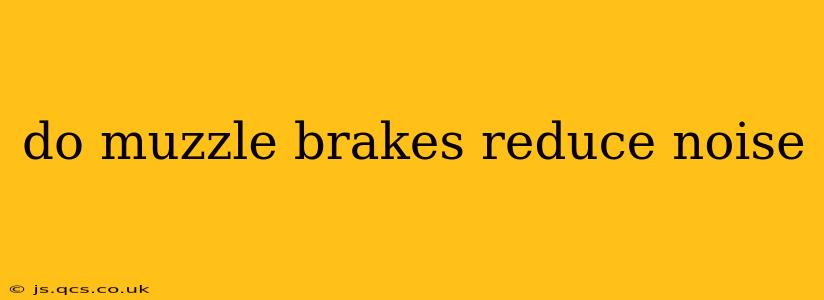Do Muzzle Brakes Reduce Noise? The Complex Answer
The short answer is: no, muzzle brakes generally do not reduce noise for the shooter or bystanders. In fact, they often increase the perceived loudness for those nearby. However, the situation is more nuanced than a simple yes or no. Let's delve into the complexities.
How Do Muzzle Brakes Work?
Muzzle brakes redirect propellant gases to the sides and rear of the firearm, counteracting recoil. This redirection is achieved through strategically placed ports or baffles within the brake's design. The gases exiting these ports create a significant amount of noise, but in different directions than the primary blast. This is the key to understanding the noise perception issue.
Why Do Muzzle Brakes Seem Quieter to the Shooter?
While the overall noise level may not decrease, many shooters report that muzzle brakes make the gun feel quieter. This is because the reduction in recoil allows for better control and a more stable shooting platform. The shooter is less distracted by the recoil impulse, allowing them to focus on the shot itself. This improved shooting experience can lead to the subjective feeling of reduced noise.
Do Muzzle Brakes Reduce Noise for Bystanders?
No, they generally do not. The redirected gases often create a louder, more disruptive noise for those standing near the shooter. The sharp, high-pitched blasts emanating from the ports of a muzzle brake can be significantly more irritating and potentially harmful than the unsuppressed gunshot alone.
What About the Myth of Noise Reduction?
The misconception that muzzle brakes reduce noise likely stems from several factors:
- Conflation with suppressors: Suppressors (or silencers) are entirely different devices designed specifically to reduce noise by slowing and cooling expanding gases. Muzzle brakes serve a distinct purpose—recoil reduction.
- Subjective experience: The reduced recoil can lead to the perception of a quieter shooting experience for the shooter, as previously discussed.
- Marketing: Some manufacturers might inaccurately market their muzzle brakes as noise-reducing to attract buyers.
What Are the Alternatives for Noise Reduction?
If noise reduction is your primary goal, you should consider using a suppressor (silencer). Suppressors work by slowing and cooling the propellant gases before they escape the barrel, significantly reducing the noise level. However, suppressors are subject to legal restrictions and regulations, which vary considerably depending on location.
What are the Different Types of Muzzle Brakes?
There are many types of muzzle brakes, each with varying designs and effectiveness. Some are more effective at reducing recoil, while others might be better suited for specific calibers or firearm types. The design choice impacts the direction and intensity of the noise produced.
Are Muzzle Brakes Legal Everywhere?
The legality of muzzle brakes varies across different jurisdictions. Some regions have no restrictions, while others may have regulations or require specific permits. It is crucial to check local laws and regulations before using a muzzle brake.
In conclusion, while muzzle brakes offer significant recoil reduction, they generally do not reduce the overall noise level, and may even increase it for bystanders. The perceived reduction in noise by the shooter is largely due to the improved shooting experience, not actual sound dampening. For noise reduction, a suppressor is the appropriate choice.
